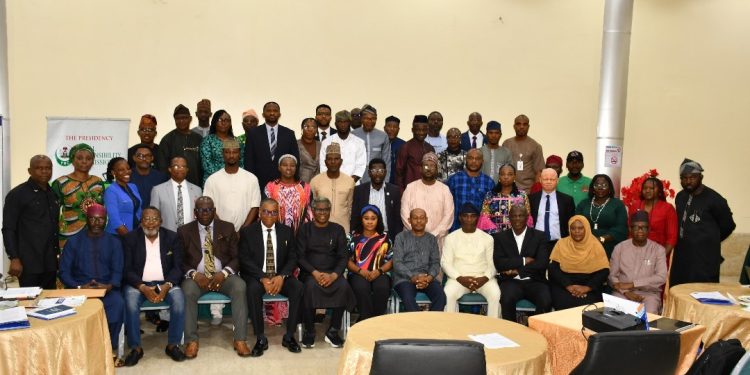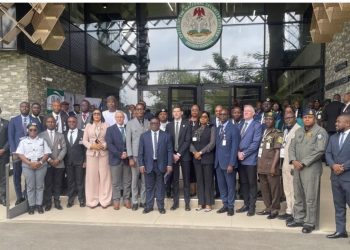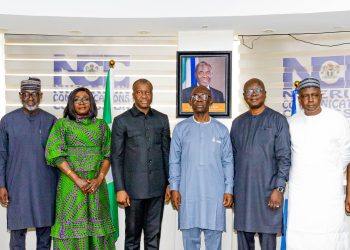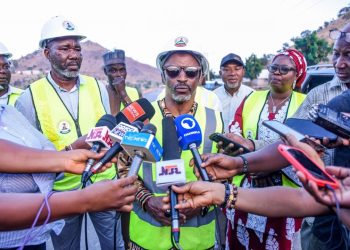By Nkechi Eze
The Fiscal Responsibility Commission (FRC) has taken a significant step toward deepening fiscal discipline, transparency, and accountability in Nigeria’s public finance system with the formal opening of its External Validation Workshop for the Draft Strategic Plan (2025–2028), held on Thursday, November 13, 2025, in Abuja.
According to an official statement signed by the Deputy Director of the Strategic Communications Directorate, Bede Anyanwu, the workshop brought together key stakeholders from across the country in a collaborative effort to evaluate, refine, and strengthen the Commission’s four-year strategic framework.
Delivering the welcome address on behalf of the Executive Chairman of the Commission, Mr. Victor Muruako, Esq., who is currently attending the International Bar Association Conference in Canada, the Chairman’s Special Adviser, Dr. Chris Uwadoka, set the tone for the day’s proceedings with a call for collective ownership of the Commission’s renewed reform agenda.
Dr. Uwadoka expressed appreciation to the Rule of Law and Anti-Corruption (RoLAC) Programme Phase II, International IDEA, and the European Union (EU) for their sustained partnership and support throughout the development of the draft strategic plan. He described the collaboration as “a clear demonstration of shared commitment to building a transparent, accountable, and fiscally responsible Nigeria.”
“This workshop is not merely a procedural step; it is a strategic milestone,” he said. “Today, we subject our draft vision, mission, strategic pillars, and performance framework to rigorous external scrutiny. We do this not out of obligation, but out of conviction that a robust, inclusive, and validated strategy is the bedrock of sustainable institutional impact.”
He noted that the 2025–2028 Strategic Plan embodies the Commission’s renewed drive to institutionalize best practices in fiscal governance, align its operations with global standards, and strengthen inter-agency collaboration in the pursuit of fiscal sustainability.
The Special Adviser commended participants drawn from key government institutions, including Commissioners of Finance from Adamawa, Anambra, Edo, Kano, and Plateau States, as well as heads and representatives of Federal Ministries, Departments and Agencies (MDAs) and Civil Society Organizations (CSOs). “Your presence here is a testament to our collective resolve to strengthen fiscal governance and curb corruption through disciplined resource management,” he said.
Dr. Uwadoka urged participants to offer constructive feedback and evidence-based recommendations that would help shape a forward-looking strategic plan. “As we engage in plenary discussions, breakout sessions, and stakeholder commitments, I urge us all to speak with candour, challenge with evidence, and commit with sincerity,” he emphasized. “Let this be a day of alignment—not just of words, but of wills.”
Organized with the support of RoLAC Phase II, the workshop provided a broad-based consultative platform for experts and partners from Nigeria’s fiscal ecosystem to validate the Commission’s vision, mission, and strategic priorities. Discussions also focused on refining measurable Key Performance Indicators (KPIs) that would guide implementation between 2025 and 2028.
The validation process, according to FRC, was designed to ensure that the strategic plan reflects the views, realities, and expectations of stakeholders across government, civil society, and the private sector, thereby promoting inclusiveness, ownership, and accountability.
Goodwill messages were delivered by eminent personalities and institutional partners, including Prof. Uba Nnabue, Prof. Nnamdi Obiareri, Prof. Philip, Barr. Willie Amadi, and Mr. Bassey Abia from the Office of the Secretary to the Government of the Federation (OSGF). A representative of the Nigerian Governors Forum (NGF) also commended the Commission for its consultative and participatory approach to reforming Nigeria’s fiscal landscape.
In her opening remarks, Ms. Patience Inyang, Project Assistant for the Anti-Corruption Component of RoLAC, formally declared the workshop open on behalf of Dr. Emmanuel Uche, Programme Manager of the Rule of Law and Anti-Corruption Programme, who was unavoidably absent due to an official engagement in Lagos.
Ms. Inyang stated that the EU-funded RoLAC II Programme, implemented by International IDEA, is proud to partner with the FRC in advancing institutional reforms that promote transparency, fiscal prudence, and public trust. She noted that the validation workshop aligns with the shared goal of the EU, RoLAC, and the FRC to strengthen Nigeria’s fiscal responsibility framework in accordance with international standards.
Workshop sessions featured expert presentations, group discussions, and plenary reviews aimed at aligning the Commission’s strategic goals with national development priorities, identifying operational gaps, and ensuring measurable outcomes that would enhance its impact across all tiers of government.
Participants also explored innovative approaches to improve public financial management, monitoring and evaluation mechanisms, and citizen participation in fiscal governance, critical elements in the broader fight against corruption and fiscal indiscipline.
As deliberations progressed, stakeholders reaffirmed their commitment to ensuring that the FRC’s 2025–2028 Strategic Plan serves as a dynamic and responsive framework capable of driving measurable change in Nigeria’s fiscal management system.
In his closing remarks, Dr. Uwadoka thanked all participants and development partners for their contributions, expressing confidence that the validated strategic plan would not only enhance the Commission’s institutional efficiency but also strengthen the nation’s economic stability and sustainable development.
“Let us begin the work of validation with focus, mutual respect, and a shared vision for a fiscally responsible Nigeria,” he concluded. “Together, we can build an economy rooted in integrity, prudence, and justice for all.”
The Fiscal Responsibility Commission’s Strategic Plan (2025–2028) is expected to serve as a comprehensive roadmap for fiscal reform and institutional strengthening, reinforcing its mandate to promote transparency, accountability, and efficient management of public resources in Nigeria.
















